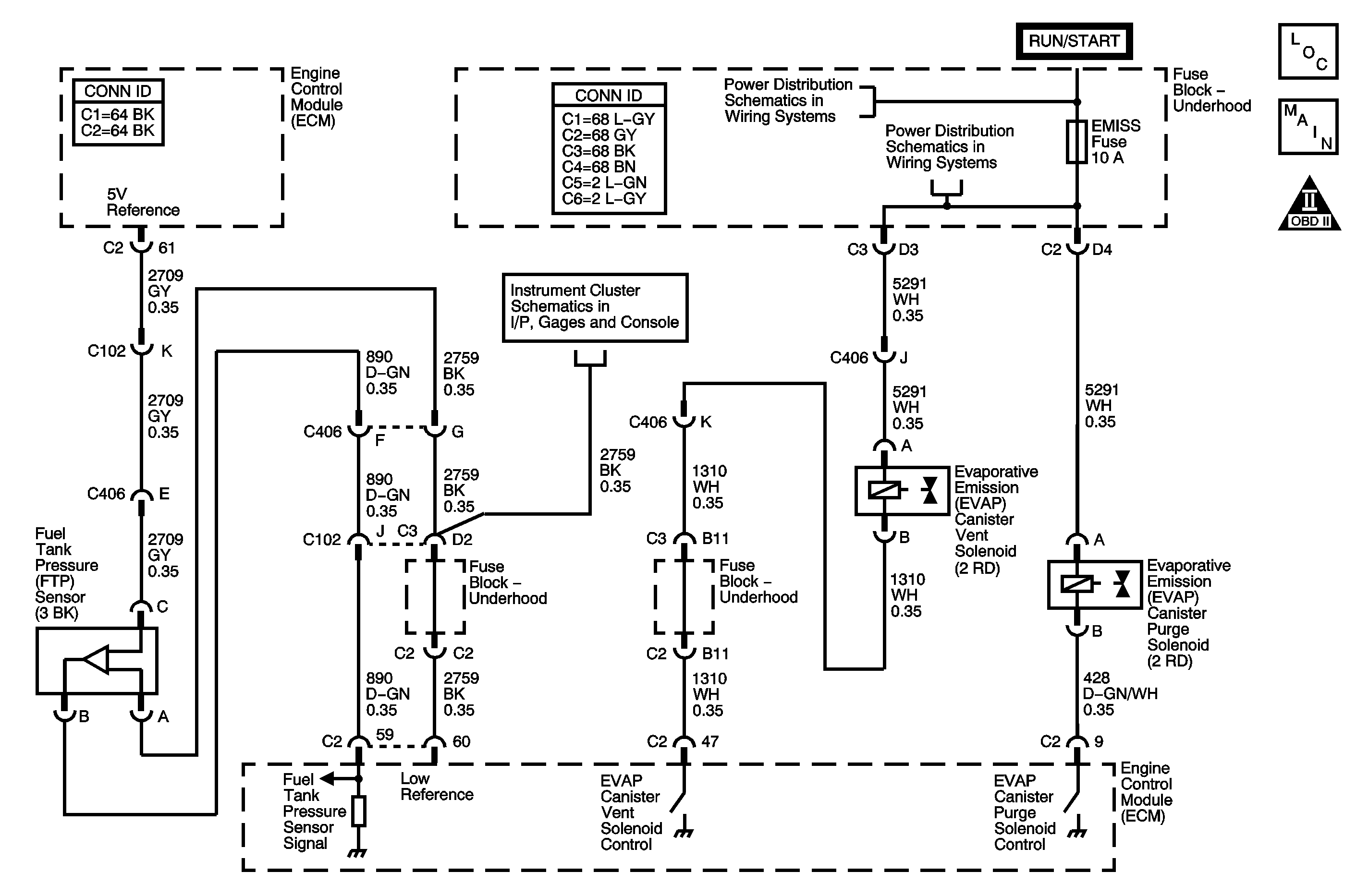
Circuit Description
The fuel tank pressure (FTP) sensor measures the difference between the air pressure or vacuum in the evaporative emission (EVAP) system, and the outside air pressure. The control module supplies a 5-volt reference and a low reference circuit to the FTP sensor. The FTP sensor signal circuit voltage varies depending on EVAP system pressure or vacuum. If the FTP sensor signal voltage increases above a calibrated value, this DTC sets.
The following table illustrates the relationship between FTP sensor signal voltage and the EVAP system pressure/vacuum.
FTP Sensor Signal Voltage | Fuel Tank Pressure |
|---|---|
High, Approximately 1.5 Volts or More | Negative Pressure/Vacuum |
Low, Approximately 1.5 Volts or Less | Positive Pressure |
Conditions for Running the DTC
The engine is running.
Conditions for Setting the DTC
| • | The FTP sensor voltage is more than 4.9 volts. |
| • | All conditions are present for more than 25 seconds. |
Action Taken When the DTC Sets
| • | The control module illuminates the malfunction indicator lamp (MIL) when the diagnostic runs and fails. |
| • | The control module records the operating conditions at the time the diagnostic fails. The control module stores this information in the Freeze Frame/Failure Records. |
Conditions for Clearing the MIL/DTC
| • | The control module turns OFF the malfunction indicator lamp (MIL) after 3 consecutive ignition cycles that the diagnostic runs and does not fail. |
| • | A current DTC, Last Test Failed, clears when the diagnostic runs and passes. |
| • | A history DTC clears after 40 consecutive warm-up cycles, if no failures are reported by this or any other emission related diagnostic. |
| • | Clear the MIL and the DTC with a scan tool. |
Diagnostic Aids
| • | If DTC P0105 is also set, a short to voltage on the 5-volt reference circuit may exist. |
| • | The A/C pressure sensor, the FTP sensor and the throttle position (TP) sensor are all tied to the same 5-volt reference source. |
| • | To locate an intermittent problem, use the scan tool to monitor FTP sensor voltage with the ignition ON, the engine OFF. Wiggling wires while watching for a change in FTP sensor voltage may locate the area where an open or a short to voltage in the wiring could lie. |
| • | If DTC P1639 is also set, diagnose that DTC first. |
| • | For intermittent conditions, refer to Intermittent Conditions . |
| • | The signal voltage with the fuel cap OFF should read between 1.30-1.70 volts, which represents atmospheric pressure or 0 inches of vacuum. |
| • | Inaccurate readings will occur if resistance measurements are taken on a FTP sensor. The FTP sensor contains an internal amplifier circuit that requires applied voltage to function properly. |
Step | Action | Values | Yes | No |
|---|---|---|---|---|
Schematic Reference: Engine Controls Schematics Connect End View Reference: Engine Control Module Connector End Views or Engine Controls Connector End Views | ||||
1 | Did you perform the Diagnostic System Check-Engine Controls? | -- | Go to Step 2 | |
2 |
Is the Fuel Tank Pressure Sensor parameter more than the specified value? | 4.3 V | Go to Step 4 | Go to Step 3 |
3 |
Did the DTC fail this ignition? | -- | Go to Step 4 | Go to Diagnostic Aids |
4 |
Is the Fuel Tank Pressure Sensor parameter more than the specified value? | 0.2 V | Go to Step 6 | Go to Step 5 |
5 | Measure the voltage of the FTP sensor 5-volt reference circuit with a DMM. Refer to Circuit Testing in Wiring Systems. Is the voltage within the specified value? | 4.8-5.2 V | Go to Step 9 | Go to Step 10 |
6 | Test the FTP signal circuit for a short to voltage or for a short to a 5-volt reference circuit. Refer to Circuit Testing and Wiring Repairs in Wiring Systems. Did you find and correct the condition? | -- | Go to Step 13 | Go to Step 12 |
7 | Test the FTP low reference for high resistance and an open. Refer to Circuit Testing and Wiring Repairs in Wiring Systems. Did you find and correct the condition? | -- | Go to Step 13 | Go to Step 8 |
8 | Test for an intermittent and for a poor connection at the control module. Refer to Testing for Intermittent Conditions and Poor Connections and Connector Repairs in Wiring Systems. Did you find and correct the condition? | -- | Go to Step 13 | Go to Step 12 |
9 | Test for an intermittent and for a poor connection at the FTP sensor. Refer to Testing for Intermittent Conditions and Poor Connections and Connector Repairs in Wiring Systems. Did you find and correct the condition? | -- | Go to Step 13 | Go to Step 11 |
10 | Repair the short to voltage in the FTP 5-volt reference circuit. Refer to Wiring Repairs in Wiring Systems. Did you complete the repair? | -- | Go to Step 13 | -- |
11 | Replace the FTP sensor. Refer to Fuel Tank Pressure Sensor Replacement . Did you complete the replacement? | -- | Go to Step 13 | -- |
12 | Replace the control module. Refer to Engine Control Module Replacement . Did you complete the replacement? | -- | Go to Step 13 | -- |
13 |
Did the DTC fail this ignition? | -- | Go to Step 2 | Go to Step 14 |
14 | Observe the Capture Info with a scan tool. Are there any DTCs that have not been diagnosed? | -- | System OK | |
